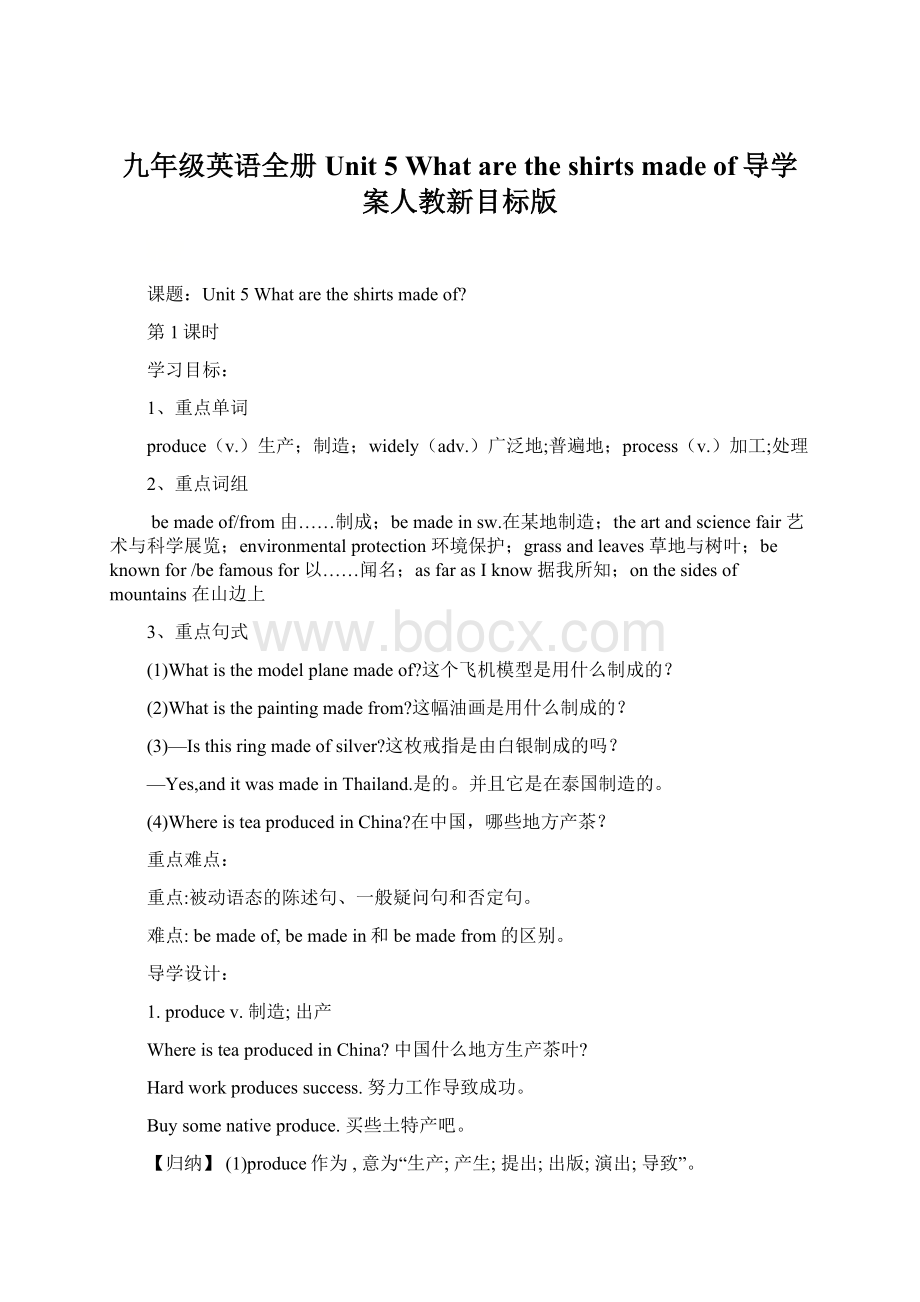九年级英语全册 Unit 5 What are the shirts made of导学案人教新目标版Word文档下载推荐.docx
《九年级英语全册 Unit 5 What are the shirts made of导学案人教新目标版Word文档下载推荐.docx》由会员分享,可在线阅读,更多相关《九年级英语全册 Unit 5 What are the shirts made of导学案人教新目标版Word文档下载推荐.docx(20页珍藏版)》请在冰豆网上搜索。

在中国,哪些地方产茶?
重点难点:
重点:
被动语态的陈述句、一般疑问句和否定句。
难点:
bemadeof,bemadein和bemadefrom的区别。
导学设计:
1.producev.制造;
出产
WhereisteaproducedinChina?
中国什么地方生产茶叶?
Hardworkproducessuccess.努力工作导致成功。
Buysomenativeproduce.买些土特产吧。
【归纳】
(1)produce作为,意为“生产;
产生;
提出;
出版;
演出;
导致”。
(2)produce作为名词,意为“产品”。
单 词
含 义
例 句
produce
农业生产的产品
Peopleliketobuynatural.
人们喜欢买天然产品。
product
工业生产的产品
That’stheofhiswork.那是他的劳动成果。
production
剧院、电视等演播的剧类、电影等
Thefilmisanational.
这部电影是国产片。
【现学现练】
(1)Theworkersare carsinthefactoryneartheriver.Theircarsareverypopular.
A.producing B.putting C.paying D.sending
(2)—Wherearetheseeveryday________(produce)from?
—TheyarefromSouthKorea.
2.widelyadv.广泛地;
普遍地
Forexample,AnxiandHangzhouarewidelyknownfortheirtea.例如,安溪和杭州就以出产茶叶而广为人知。
Theriverisverywide.这条河非常宽。
Openyourmouthwide.把嘴张大。
Hehastraveledwidely.他到过很多地方。
【归纳】wide与widely的异同
wide
作形容词,意为“宽的;
宽阔的”
作副词,主要表示“张大,睁大”到最大程度,侧重指物体从一边到另一边的距离
widely
作副词,主要表示距离远、范围大、地域广等,通常与过去分词连用
【现学现练】
(1)Englishisthemost usedlanguageintheworld.
A.widely B.wisely C.quickly D.quietly
(2)Cornsare______(wide)plantedinAmerica.Theyaresoldtomanyothercountries.
3.bemadeof由……制成的
Isitmadeofsilver?
它是由银制成的吗?
Breadismadefromwheat.面包是由小麦制成的。
ThecarismadeinShanghai.这辆车是在上海制造的。
【归纳】bemade短语辨析
意为“是……(原材料)制成的”。
介词of后的原材料往往是发生物理变化,仍可看出材料的原样
介词from后的原材料往往是经过化学变化,已经看不出材料的原样
意为“在……制造(生产)”。
in后面跟表示地点的名词
(1)Thescarfwhichis silk softandcomfortable.
A.madefrom;
feels B.madeof;
feels
C.madein;
smellsD.madeupof;
smells
(2)这些T恤衫是棉制的,穿着很舒服。
TheseT-shirts___________cotton.Theyarecomfortabletowear.
知识巩固:
Ⅰ.用所给词的适当形式填空
1.Theringis______(make)ofgold.Itlooksbeautiful.
2.WeChatisused______(wide)everywhere.
3.Everyoneshouldpaymoreattentiontothe______(environment)protection.
4.Myfavoriteanimalispandasandtheylikeeatingbamboo______(leaf).
5.TheGreatWalliswell______(know)aroundtheworld.
Ⅱ.根据教材2d内容,完成下面短文,每空一词
Chinaisfamousfortea1._______inthepast2._______now.Tea3._______inmanydifferentareas.Forexample,AnxiandHangzhouare4._______fortheirtea.Teaplantsare5._______onthesidesofmountains.Whenthe6._______areready,they7._______byhandandthenaresentfor8._______.Next,thetea9._______and10._______tomanydifferentcountriesandplacesaroundChina.It11._______thatmanypeoplealloverthe12._______drinkChinesetea.Theysaythatteaisgoodforboth13._______and14._______!
参考答案:
1.
(1)动词
(2)produce;
production;
product【现学现练】
(1)A
(2)products
2.【现学现练】
(1)A
(2)widely
3.【归纳】bemadeof;
bemadefrom;
bemadein【现学现练】
(1)B
(2)aremadeof
Ⅰ.1.made2.widely3.environmental4.leaves5.Known
Ⅱ.1.both2.and3.isproduced4.known5.grown6.leaves7.arepicked8.processing9.ispacked10.sent11.seems12.world
Unit5Whataretheshirtsmadeof?
第2课时
France法国;
local(adj.)当地的;
本地的;
avoid(v.)避免;
回避;
product(n.)产品;
制品;
handbag(n.)小手提包;
mobile(adj.)可移动的;
非固定的;
everyday(adj.)每天的;
日常的;
boss(n.)老板;
上司;
Germany德国;
surface(n.)表面;
表层;
material(n.)材料;
原料;
traffic(n.)交通;
路上行驶的车辆;
postman(n.)邮递员;
cap(n.)帽子;
glove(n.)手套
Americangoods美国商品;
nomatterwhat无论什么;
productsinthelocalshops本地商铺的产品;
madeinChina中国制造;
everydaythings日常用品;
makehigh-technologyproducts制造高科技新产品;
inallpartsoftheworld在世界所有的地区;
hisshoppingexperiences他的购物经历;
onthelastFridayofeachmonth在每个月的最后一个星期五;
inGermany在德国;
mostoftheearth’ssurface地球的大部分表面;
causemanytrafficaccidents导致许多的交通事故;
usethissilverplate使用这个银制的盘子
(1)Nomatterwhatyoumaybuy,youmightthinkthoseproductsweremadeinthosecountries.无论你可能买什么,你都可能认为这些产品是在这些国家生产的。
(2)HefounditinterestingthatsomanyproductsinthelocalshopsweremadeinChina.他很有趣的发现有如此多在本地商铺的产品是中国制造的。
(3)HerealizedthatAmericanscanhardlyavoidbuyingproductsmadeinChina.他意识到美国人也不可避免地可能买中国制造的产品。
(4)However,hewishesthatinthefutureChinawillalsogetbetteratmakinghigh-technologyproductsthatpeoplecanbuyinallpartsoftheworld.然而,他希望在将来中国也能更擅长制造让人们在世界各地都能买到的高科技产品。
(5)—Areyourshirtsmadeofcotton?
你的衬衣是由棉花制成的吗?
—Yes,theyare.AndtheyweremadeintheUS.是的。
并且是在美国制造的。
(6)—What’sthemodelplanemadeof?
这个飞机模型是由什么制成的?
—It’smadeofusedwoodandglass.它是由废弃的木材和玻璃制成的。
(7)—Wherewasyourpencilmade?
你的铅笔是在哪制造的?
—ItwasmadeinShanghai.它是在上海制造的。
(8)—WhatlanguageisspokeninGermany?
在德国讲什么语言?
学习重难点:
学会运用nomatter引导的让步状语从句。
通过交流表达和阅读训练,读懂含有被动语态的短文。
1.nomatter不论;
无论
Nomatterwhatyoumaybuy,youmightthinkthoseproductsweremadeinthosecountries.
无论你买什么,你可能会想到那些产品是在那些国家制造的。
Don’tbelievehim,nomatterwhat(whatever)hesays.不管他说什么,你都不要相信。
【归纳】
nomatter意为“不管……;
不论……”,后可接what,when,who等从属连词引导让步状语从句。
从句的语序必须是陈述语序。
nomatterwhat=,=whenever,nomatterwho=。
(1)无论何时你来,我都会热烈欢迎你。
______________youcomehere,Iwillwelcomeyouwarmly.
(2) youdo,Iwillsupportyouallthetime.
A.Whatever B.Whoever C.Whenever D.Wherever
2.avoidv.避免;
回避
HerealizedthatAmericanscanhardlyavoidbuyingproductsmadeinChina.
他意识到美国人几乎不能避免买中国制造的产品。
Ithinksheisavoidingme.我想她是在躲着我。
Trytoavoidaccidents.尽量防止发生事故。
【归纳】作动词,可表示“避开”或“躲避”某人或某物,也可表示“防止”某事的发生。
其后可接名词或代词作宾语,也可接动名词作宾语,但是不能接不定式作宾语。
(1)我选择了一条小路来避开高峰时的车流。
Ichosetotakeapathto_____therush-hourtraffic.
(2)Iwilltrymybesttoavoid thesamemistakesagain.
A.make B.tomakeC.madeD.making
3.everydayadj.每天的;
日常的
KangJianthinksit’sgreatthatChinaissogoodatmakingtheseeverydaythings.
康健认为中国这么擅长制造这些日用品真是太棒了。
WehaveEnglishlessonseveryday.我们每天上英语课。
ShespeakseverydayEnglishverywell.她日常英语说得很好。
【归纳】everyday与everyday
everyday
为形容词,意为“”。
在句中作定语,修饰名词
everyday
为副词,意为“”,在句中作时间状语
(1)Mymother’s jobisreceivingandsendinge-mailsinthecompany .
A.everyday;
everyday B.everyday;
everyday
C.everyday;
everydayD.everyday;
everyday
(2)手机已经成为我们日常生活的一部分。
Themobilephonehasalreadybecomepartofour___________.
4.一般现在时的被动语态
(1)—Areyourshirtsmadeof(由……制成)cotton?
—Yes,theyare.Andtheyweremadein(在……被制成)theUS.
(2)—Whereisteaproduced(被生产)inChina?
—It’sproducedinmanydifferentareas.
(3)—Howistea_produced(被生产)?
—Teaplantsaregrown(被种植)onthesidesofmountains.Whentheleavesareready,theyarepicked(被采摘)byhandandthenaresent(被送去)forprocessing.
【归纳】一、语态的概念
语态表示主语和谓语动词之间的关系,指出谓语动词的动作是由主语发出的还是主语是谓语动词的承受者。
英语中有两种语态:
主动语态和被动语态。
1.主动语态:
表示谓语动词的动作是由主语发出的。
这时主语是动作的。
例如:
Ithiswork.我完成了这项工作。
(“havefinished”这个动作是由“I”发出的,因此“I”就是动作的执行者。
)
2.被动语态:
表示句子的主语是谓语动词的动作的,或者主语是动作的对象。
因此,只有及物动词才有被动语态。
Hebyhisfather.他受到他父亲的惩罚。
(句中的“He”就是谓语动词“punished”的承受者。
)
在被动语态的句子中,如果想强调动作的执行者时,用介词by加动作的执行者来表示。
Theglassonthedeskwasbrokenme.桌子上的玻璃杯是我打碎的。
二、被动语态的构成
1.一般现在时被动语态的构成:
2.一般现在时被动语态在各种句式中的运用:
句式
构 成
肯定句
主语+助动词be(am/is/are)+及物动词的过去分词(+by短语)+其他.
Themilkinthefridge.
否定句
主语+助动词be(am/is/are)+not+及物动词的过去分词(+by短语)+其他.
一般疑问句
助动词Be(Am/Is/Are)+主语+及物动词的过去分词(+by短语)+其他?
themilkinthefridge?
肯定
回答
Yes,主语+助动词be(am/is/are).
Yes,itis.
否定
No,主语+助动词be(am/is/are)+not.
No,itisn’t.
特殊疑问句
疑问词(不作主语)+助动词be(am/is/are)+主语+及物动词的过去分词(+by短语)+其他?
Whereisthemilkkept?
三、被动语态的用法
1.在不知道动作的执行者是谁时。
Everythinghasbeentakenaway.一切都被拿走了。
(不知道是谁拿走的)
Thesebooksforchildren.这些书是为孩子们写的。
(不知道是谁写的)
2.当动作的执行者是泛指或不言自明时。
Notabookinthelibraryhasbeentakenaway.没有一本书在图书馆里被人带走。
(泛指任何人)
Chinain1949.1949年中国解放。
(不言而喻是中国共产党解放的)
3.虽然可以说出动作的执行者,但动作的承受者是谈话中心或特别需要强调时。
Mywatchhasbeenrepaired.我的表修好了。
(表修好了是谈话的主旨,是谁修好不必提及)
Shebyeveryoneinourclass.班里每个人都喜欢她。
(强调她)
4.出于委婉、礼貌而避免提及自己或对方时。
Youtodoitmorecarefully.希望你认真一点儿做。
(谁希望,不愿或不便说出来)
5.当人不是动作的执行者时。
Webythenewsofhissuddendeath.他的突然去世使我们大家都感到震惊。
四、主动语态变为被动语态的方法
先确定主动句的主、谓、宾,再将主动句的宾语变成被动句的,主动句的主语变成被动句中介词by的(没必要说出动作的执行者时可略去“by+宾语”);
主动句的谓语动词要变成“助动词be+及物动词的过去分词”,但时态不能改变;
变化时还得注意“数”(助动词要与新的主语保持“数”的一致)和“格”(若主语和宾语是人称代词,“宾作主”时宾格要变成主格,“主作宾”时主格要变成宾格);
时间状语、地点状语等其余部分可重现于被动句中。
(1)Chineseis_______(learn)asthenativelanguageinChineseschools.
(2)Theseplants_________(take)goodcareofbymymother.
(3)Usually,thehouseworkinmyfamily_________(notdo)intheafternoon.
(4)____thesmalltrees_______(water)everymorning?
(5)Thenewclothes________(give)tothepoorchildrennow.
(6)__thepark______(visit)bymanypeopleeveryday?
(7)Howmanylanguages________(use)inCanada?
(8)Theworkers________(make)toworkfortwenty-sixdayseverymonth.
(9)Basketballandfootball_________(play)bythestudentsafterschool.
(10)Running___________(notallow)inthehallwayoftheschool.
知识巩固
1.Althoughtheyarefrom_______(German),theyspeakEnglishwell.
2.Wecan’tavoid_______(speak)ofthesehomelesschildren.Theyneedo